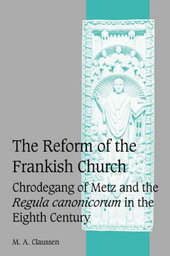
|
The Reform of the Frankish Church: Chrodegang of Metz and the Regula canonicorum in the Eighth Century
Paperback / softback
Main Details
| Title |
The Reform of the Frankish Church: Chrodegang of Metz and the Regula canonicorum in the Eighth Century
|
| Authors and Contributors |
By (author) M. A. Claussen
|
| Series | Cambridge Studies in Medieval Life and Thought: Fourth Series |
|---|
| Physical Properties |
| Format:Paperback / softback | | Pages:364 | | Dimensions(mm): Height 229,Width 152 |
|
| Category/Genre | World history - c 500 to C 1500
The Early church
Church history |
|---|
| ISBN/Barcode |
9780521065375
|
| Classifications | Dewey:274.4385302 |
|---|
| Audience | | Professional & Vocational | |
|---|
| Illustrations |
2 Maps; 1 Halftones, unspecified
|
|
Publishing Details |
| Publisher |
Cambridge University Press
|
| Imprint |
Cambridge University Press
|
| Publication Date |
12 June 2008 |
| Publication Country |
United Kingdom
|
Description
Chrodegang of Metz (c. 712-766) was a leading figure of the late Merovingian and early Carolingian Church. Born to one of the principal aristocratic families in Austrasia, he served as referendary of Charles Martel, and was appointed bishop of Metz in the 740s. As bishop, Chrodegang became one of the foremost churchmen in Francia, chairing councils, founding monasteries, and beginning a reform of the lives of the canons of the Metz cathedral. This book is a major study in the English language on Chrodegang, examining his preoccupation with the creation of communities of faith and concord modelled on the early Church. It explores his attempts to unite the Frankish episcopacy, his rule for the cathedral clergy in Metz - the Regula canonicorum - and his introduction of new liturgical practices that sought to transform his see into a hagiopolis, a holy city which provided a model for later Carolingian reform.
Author Biography
M. A. Claussen is Associate Professor at the University of San Francisco and the author of articles on Church History.
Reviews"In making the difficult leap from close reading to historical reconstruction and speculation, Claussen provides a model for how to integrate the philological and the theoretical, for how literary analysis can serve historical inquiry, and for why a close reading of the Latin text matters. The result is a compelling book that will be of great interest to both Latinists and church historians." - H-German, Anna Taylor, Department of History, University of Texas at Austin
|